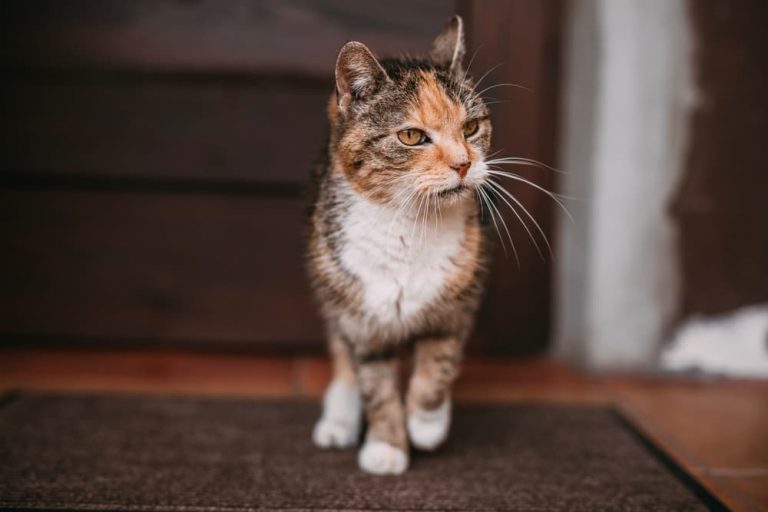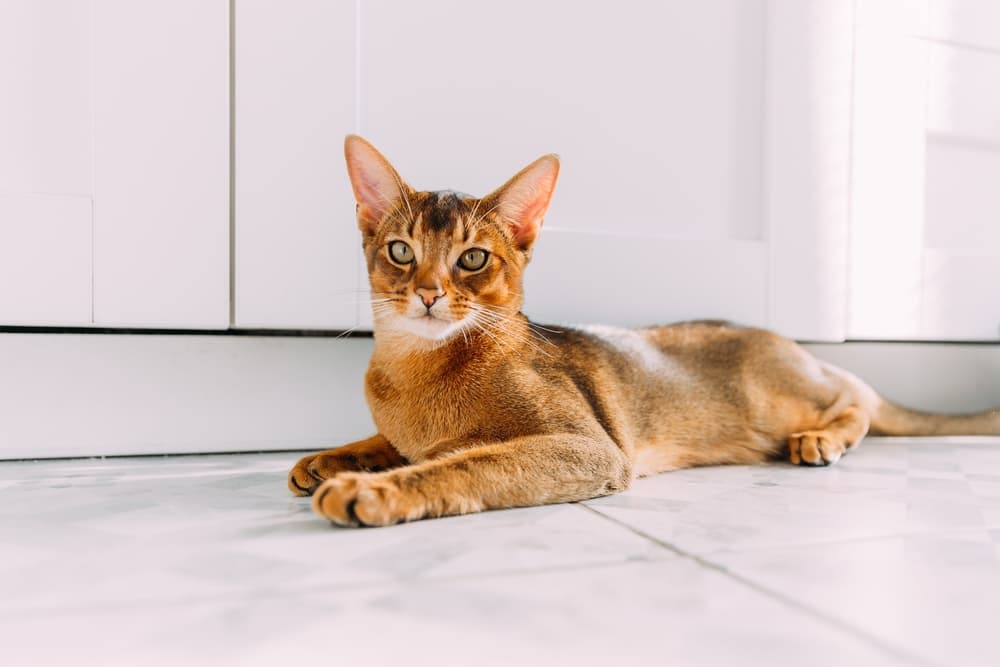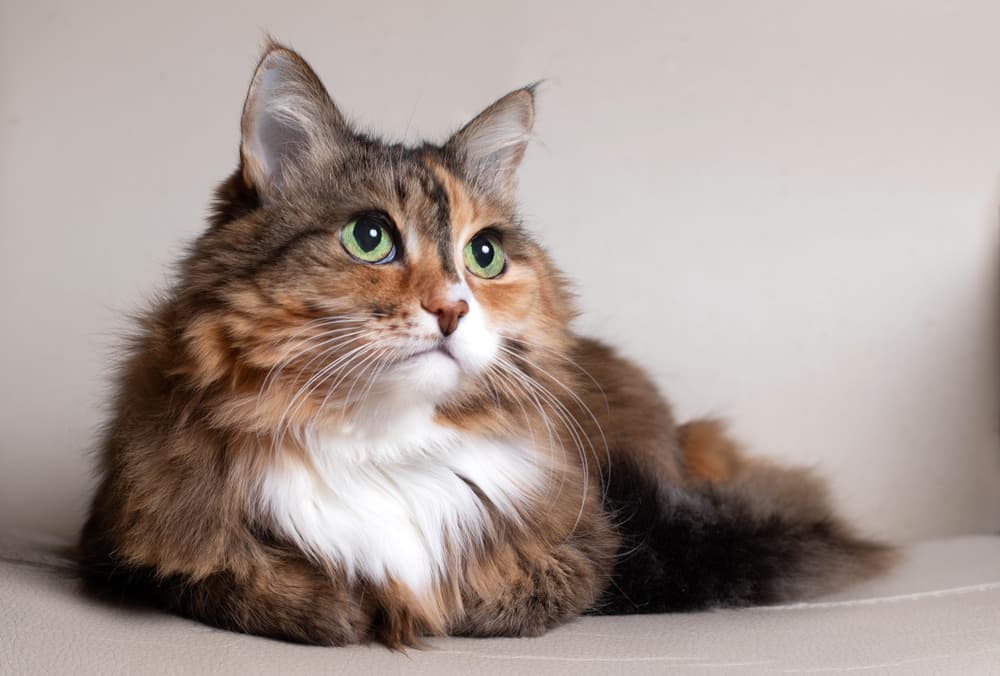Sponsored by CareCredit
Older Cat Losing Weight: 8 Common Causes

As cats age, things change – their behavior, their playfulness, but also their health including their metabolism and their weight. Without enough protein, fat and other nutrients, senior cats lose muscle and start to look scrawny.
In fact, 15 percent of cats over 12 years old have a low body condition, meaning they do not have enough muscle or weigh less than they should.
But how do you know if your older cat losing weight is normal? What does weight loss look like in senior cats and when should you discuss your cat’s weight with your veterinarian? Let’s explore senior cat weight loss in more detail.
Senior Cat Weight Loss: Is It Common?
Senior cat weight loss is very common. Senior cats have a decreased ability to absorb fat and protein. They lose about 1/3 of their lean body mass, meaning the weight your cat would be without any fat.
After cats reach 11 years old, they require more nutrition just to maintain their resting body weight. This can result in weight loss, particularly if a health condition causes your cat to not eat well.
While some weight loss is common for senior cats, it is not necessarily normal. Many health conditions that cause your cat to need even more nutrients occur more frequently in senior cats. Many times, older cats hide their illness until they feel very sick, and too much weight loss occurs rapidly.
It’s important to speak with your veterinarian as soon as you notice signs of weight loss in your cat, especially if accompanied by changes in behavior, decreased appetite, or decreased activity level. Catching health concerns early will make them much easier to treat and keep your cat comfortable.
Create a free GreatPetCare account to monitor your cat’s weight using our handy Weight Tracker tool. Plus, when you download the GreatPetCare app, you can log weight changes, set custom reminders, and manage your pet’s medical records easily on the go!
What Does Senior Cat Weight Loss Look Like?

Many senior cats lose weight gradually, so it is difficult to notice the weight loss when you see your cat every day. However, if a senior cat is ill, it is possible that weight loss can be quick and dramatic. If you can’t recall when your cat started to lose weight, and the changes in appearance are subtle, the weight loss has likely been a gradual process.
There are two types of weight loss: total body mass and lean body mass, or muscle. When a cat loses weight, the body tries to prevent the loss of lean body mass, so fat is eliminated first. However, in some nutritional issues or medical conditions, muscle is lost instead. This is coupled with the natural loss of muscle in senior cats.
Loss of total body mass is easier to spot – your cat has less fat under the stomach and around the waist, and the midsection looks smaller.
Muscle loss is tougher to identify but is easiest to tell when running your hand down the spine of your cat. The spine, a row of bones, have bony pieces that stick up. Typically, good amounts of muscle cause the spine to feel fairly flat. However, when muscle loss occurs, the bones protrude more and are much easier to feel firm bumps down your cat’s back. Other muscles are affected as well, including the legs which will look skinnier, especially the back legs.
Any weight loss in senior cats should be investigated especially if it goes along with other concerns like vomiting or decreased appetite. Again, since cats hide their illness until very sick, even mild weight loss should be brought up to your veterinarian.
Why Is My Older Cat Losing Weight? 8 Common Causes

In order to treat your cat’s weight loss, it’s important for veterinarians to identify the cause of the weight loss. These are common reasons that older cats lose weight:
Dental disease. Issues with the teeth or inflammation in the gums can make chewing and eating quite painful. Infection can occur which makes cats feel ill.
Inflammatory bowel disease. Inflammatory bowel disease (IBD) is when a cat’s intestines and/or stomach is inflamed. It could be allergies to food or just inflammation in general with no known cause. Chronic diarrhea or just inflammation in the intestines can lead to loss of protein, which causes general weight loss and higher loss of muscle.
Chronic kidney disease. Kidney issues in cats are very common. Kidney disease often leads to nausea, which results in decreased appetite, and increased loss of protein. This causes muscle loss in cats.
Hyperthyroidism. Thyroid hormone is produced in higher amounts, leading to much higher nutrient needs. Often, cats with hyperthyroidism experience gastrointestinal (GI) side effects such as vomiting, which further decreases their ability to get enough nutrition.
Diabetes mellitus. When cats have diabetes, their insulin production is decreased. Insulin is a hormone that regulates blood sugar. Diabetes results in many hormonal changes that cause cats to lose weight, including breaking down muscle. Diabetic cats have very specific nutritional needs, and their weight will not return until their blood sugar is regulated.
Cancer. Cancer of any part of the body could be to blame for weight loss and can be very hard to detect until it is in advanced stages in cats.
Degenerative joint disease (arthritis). While arthritis will not cause weight loss in cats directly, it often causes cats to be less active which causes decreased muscle due to not using it as much. Arthritis can make walking or retrieving food quite painful and decrease the amount of nutrition that your cat gets.
Normal aging. It is a normal aging process to lose muscle as well as a little body weight overall. Just keep in mind that this would be very gradual and in very small amounts. Pet parents should never assume weight loss in a senior cat is normal until they have spoken with their veterinarian.
Other Symptoms to Note
Symptoms that may go along with an older cat losing weight include:
- Vomiting
- Diarrhea
- Decreased activity
- Changes in behavior, like vocalizing at night
- Changes in your cat’s habit of jumping (i.e. not jumping onto surfaces the cat used to)
- Not eliminating in the litter box
- Increased urine
- Increased drinking
Some pet parents report fur loss, or a different appearance to the fur, when they discover their cat lost weight. This can be due to pain or discomfort that your cat is feeling due to an underlying illness like arthritis. Cats may remove their fur in times of mental stress, but this is rare.
If you notice these symptoms in conjunction with weight loss, you should make an appointment to see your veterinarian.
Cats can lose weight without displaying other symptoms and while having a good appetite. This may happen due to hormone differences or imbalances or the diet they are eating is no longer supporting their nutritional needs. Talk to your veterinarian if you have concerns about your senior cat’s weight loss.
What to Do If You Notice Weight Loss

If you notice your older cat losing weight, speak with your veterinarian right away and make an appointment for a health assessment. A thorough examination will be performed, paying close attention to your cat’s teeth and if the weight loss noted is muscle loss or overall weight loss.
Most veterinarians will recommend bloodwork and urine testing to evaluate how well your cat’s organs are functioning. This bloodwork will likely include a thyroid test. If these are normal, depending on what your veterinarian saw during examination, she is likely to make further recommendations, which may include X-rays to look for arthritis and to get a better look at your cat’s organs.
As you and your vet get to the bottom of your cat’s weight loss, you may start to feel stressed about covering the costs of laboratory and diagnostic services or medications your cat may need. Even if you have pet insurance, it may not cover everything. A veterinary financing option like the CareCredit credit card can be another tool in your arsenal that helps provide flexibility and peace of mind.*
Helping Senior Cats Gain Weight

It is very important that senior cats gain weight until they have reached (or slightly exceed) their ideal weight. Veterinarians determine ideal weight by using a chart comparing different body conditions.
Here are some things that can help older cats gain weight:
Medications: Most of the diseases that cause weight loss can be treated or managed with medications. Antinausea medications often increase appetite, which can help support weight gain in older cats.
Appetite stimulants: Appetite stimulants are medications that increase a cat’s appetite. If your cat is being picky about eating or doesn’t seem to be eating as much as they should, an appetite stimulant may be helpful.
Nutritional supplements: Nutritional supplements can help support healthy aging and decrease weight loss in cats. Glucosamine, chondroitin, and omega fatty acids support joint health. Coenzyme Q10 helps the body recycle and reuse vitamin E, which eliminates free radicals. Speak with your veterinarian about what supplements are best for your cat.
Dietary changes: Diet is key to preventing weight loss. First and foremost, it must be palatable to your cat – meaning your cat likes the taste, smell, and texture of the food and eats it well. Cats’ taste can change as they age, and as pet parents we need to search for a nutritious diet made for senior cats that they enjoy. If a medical condition exists, prescription diets are ideal since they are specially designed to provide the exact nutrition your cat needs. Feeding high protein and low carbohydrate food is best for senior cats.
*Subject to credit approval
This information is shared solely for your convenience. Neither Synchrony nor any of its affiliates, including CareCredit, make any representations or warranties regarding the products described, and no endorsement is implied. You are urged to consult with your individual veterinarian with respect to any professional advice presented.









